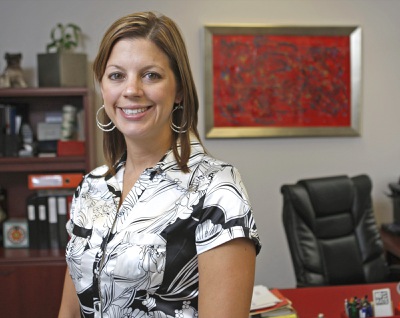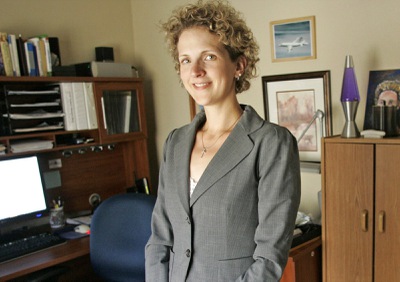Friday, June 19, 2009 | 3 a.m.
Usually when a well-regarded lawyer leaves a major firm to start her own it’s a midcareer change that adds a touch of adventure to her practice.
But as the local economy took a nose dive into the caliche, a new breed of entrepreneurial lawyer emerged. They are younger and more desperate than those who came before them. Many were recently laid off.
Las Vegas attorneys Tara Young and Elizabeth Sorokac lost their jobs in February after Kummer Kaempfer Bonner Renshaw & Ferrario downsized. Both have been practicing for only a few years and both were terrified when they learned their income had disappeared.
“I absolutely loved it there and had no intention of ever leaving,” Sorokac said. “I had plans to stay there for the rest of my career, raise a family ... I really was shocked (to get laid off), to say the least. I did not see it coming. There are certain things now that I think should have been gigantic clues, but for some reason they weren’t.”
Sorokac hit the phones and landed interviews at a few other firms in town. But the job offers she hoped for never materialized.
After about a month, she decided to do some zone and permit work out of her home to stay afloat.
Within two weeks she signed a lease on an executive suite, set up a full-fledged business and began taking referrals from the State Bar of Nevada for litigation and government affairs work.
And much to her surprise, she found she really likes it. She’s been able to fly to Michigan to visit her parents whenever she likes and she loves working at her own pace.
“I think that when I first figured out I had to do this that it would be more a weathering the storm situation,” Sorokac said. “But in the last month I’ve realized it would take something really special to get me to go back to a firm or governmental type job. I like being my own boss. I like having the flexibility.”
Young took less time to take the plunge. She was out forming her own firm within days of getting laid off.
“In these economic times I didn’t want to work for another firm and then just get laid off again,” Young said. “I think I would have eventually taken this course, but this forced me to take it a lot sooner than I anticipated.”
Young and her husband have two children, and she knew that working from home would allow her to spend more time with them while still moving forward with her career. Her new role as a sole practitioner helping clients with small business and broad personal legal issues is more fulfilling, she said.
“I can control the type of work that I do and when I do it,” she said. “I feel like I’m truly helping individuals and businesses. When I was at a large firm I had large institutional clients and they appreciated my services, but now I deal with individuals, and when they have an acute problem it’s great to know I’m helping them directly.”
James Stout walked out of his job at Lee and Hernandez last summer, burned out after years of construction-defect cases that had left him harried and a bit lost.
He took the Leadership in Energy and Environmental Design exam in the fall. By January, he began leasing an office in the headquarters of a colleague’s law firm.
“I had been doing the same litigation for 13 years and wanted to try something new,” Stout said. “I had no idea when the economy was going to recover, so I couldn’t time my leaving to an upturn in the economy. I thought it would be better to start at the bottom of the economy and ride it up.”
Like Young and Sorokac, Stout keeps busy with a variety of legal work. He said the rough economy has led to an increased need for legal services, but most people can’t afford big-firm prices.
That actually gives sole practitioners an edge.
“There’s probably more clients and people in need than usual, and they’re looking to small firms. But it’s harder to get paid,” Stout said. “My overhead is a lot less, and I was prepared for this. I was prepared for fewer clients and not getting paid. It’s washed out — I have more clients, but (I am) getting paid less often. But I’m in a position where I can be flexible with the market.”
What it used to be like
Lawyers leaving big firms to start their own practice are nothing new. Many of the firms in Las Vegas were started by lawyers who left large firms for one reason or another.
But things are different for the startup law firms of today, said attorney John Baily of Bailey Kennedy.
Bailey and his receptionist left a lucrative practice at the state’s largest law firm eight years ago.
People thought he had gone off his rocker. Bailey had spent 16 years at Lionel Sawyer & Collins, becoming a partner with a thriving practice.
But Bailey thought there was more out there than a comfortable practice in a high-rise office.
“There came a point when I just wanted a different type of a challenge and an opportunity to demonstrate my leadership skills,” Bailey said. “When I left Lionel Sawyer & Collins I think 80 percent of people I spoke to thought I was absolutely nuts ... Those people could not understand why I would leave that kind of security. But 20 percent were envious and said they wished they could take that leap.”
The thing he has enjoyed most about starting his own firm is handpicking new attorneys and building an office culture that is collegial, invigorating and, most important, drama free.
He said it will probably be tougher for new firms today because of the higher number of out-of-state firms and the flood of unemployed lawyers coming out of the real estate bust and looking for work.
“I think it’s more challenging today,” he said. “When I left, the market was fine ... and now as we all know the market has changed dramatically.
“I think if you’re considering leaving an established firm, you really have to analyze the market in terms of whether you’re going to have opportunities or not.”
For those starting firms after losing jobs, Bailey advises hanging on and trusting that the reputation they built at the larger firms will carry them through — and to have fun.
“It’s exciting to go out and do something different and take on a new challenge,” Bailey said. “It’s like climbing a mountain for the first time: You don’t know what to expect until you’ve done it.”
It’s not just happening in Vegas
Becoming a sole practitioner after a layoff extends beyond Las Vegas.
About 75 percent of American lawyers practice in firms with five or fewer attorneys, according to David Galbenski, author of “Unbound: How Entrepreneurship Is Dramatically Transforming Legal Services Today.”
Those numbers could go up as law firms in major markets and large, international firms shed staff across the country.
“When you talk about a trend, people are saying if they can’t get a job at a law firm, they’re setting up their own,” Galbenski said. “I think you will see more and more of that as the job market continues to be difficult for entry-level lawyers. That happens in any industry when job prospects are bleak. When you have an economic situation like we have now, entrepreneurship in general is sure to blossom, and law is no different.”
Many of those forced into becoming sole practitioners are finding they like it and are less likely to go back to corporate firms as the economy recovers, Galbenski said. That could really change the dynamics of legal markets across the country.
Many of the more-experienced unemployed attorneys are advocates of alternative billing and other new business models. They have good reputations in the legal community, but their rates are cheaper. Increasingly, they’re outsourcing some work to lawyers in offshore firms.
“They’re going out and building the law firms of tomorrow and using different ways to bring in labor,” Galbenski said. “Everyone is looking at it from the scope of ‘better, faster, cheaper’ and a lot of these five- to seven-year lawyers say that they can do it. That’s what we’re seeing nationally. Market by market, that’s how people are looking at their future.”
Eight of the 10 attorneys laid off at Kummer Kaempfer in Nevada are sole practitioners. They’ve been joined by other lawyers who are between jobs after the housing bust or from businesses that have downsized legal departments.
And now that they’ve broken out on their own, many aren’t sure they want to go back.
“There was a time if you lost your big-firm job you just went to the next big firm,” Young said. “People are reevaluating whether they can do that or even if they want to do that.”




Join the Discussion:
Check this out for a full explanation of our conversion to the LiveFyre commenting system and instructions on how to sign up for an account.
Full comments policy